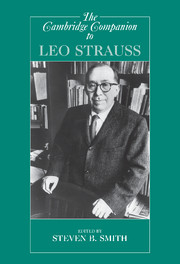Book contents
- Frontmatter
- 1 Introduction: Leo Strauss Today
- 2 Leo Strauss: The Outlines of a Life
- 3 Leo Strauss and the “Theologico-Political Predicament”
- 4 Strauss’s Recovery of Esotericism
- 5 Strauss’s Return to Premodern Thought
- 6 Leo Strauss and the Problem of the Modern
- 7 The Medieval Arabic Enlightenment
- 8 “To Spare the Vanquished and Crush the Arrogant”: Leo Strauss’s Lecture on “German Nihilism”
- 9 Leo Strauss’s Qualified Embrace of Liberal Democracy
- 10 Strauss and Social Science
- 11 The Complementarity of Political Philosophy and Liberal Education in the Thought of Leo Strauss
- 12 Straussians
- Bibliography
- Index
- Series List
2 - Leo Strauss: The Outlines of a Life
Published online by Cambridge University Press: 28 November 2009
- Frontmatter
- 1 Introduction: Leo Strauss Today
- 2 Leo Strauss: The Outlines of a Life
- 3 Leo Strauss and the “Theologico-Political Predicament”
- 4 Strauss’s Recovery of Esotericism
- 5 Strauss’s Return to Premodern Thought
- 6 Leo Strauss and the Problem of the Modern
- 7 The Medieval Arabic Enlightenment
- 8 “To Spare the Vanquished and Crush the Arrogant”: Leo Strauss’s Lecture on “German Nihilism”
- 9 Leo Strauss’s Qualified Embrace of Liberal Democracy
- 10 Strauss and Social Science
- 11 The Complementarity of Political Philosophy and Liberal Education in the Thought of Leo Strauss
- 12 Straussians
- Bibliography
- Index
- Series List
Summary
““[Strauss's] primary interests were two questions: one, the question of God; and two, the question of politics.”” Jacob Klein / Leo Strauss was born in the small German town of Kirchhain in Hesse on September 20, 1899. According to a later autobiographical statement, he was brought up in “a conservative, even orthodox Jewish home” where the “ceremonial laws were rather strictly observed.” This did not prohibit his parents from sending him to study at the prestigious Gymnasium Philippinum in nearby Marburg, where among his classmates was the future Harvard political scientist Carl J. Friedrich. It was here that Strauss was first introduced both to the classics of Greek philosophy and the tradition of German humanism. Strauss's upbringing was conventional for the era. He said that the Jews of his area “lived in a profound peace” with their non-Jewish neighbors. This was due to a government - the Kaiserreich - “not in every respect admirable” but that managed to maintain “an admirable order everywhere.” This sense of certainty was shaken, when he was a child, by the experience of observing a group of refugees from a Russian pogrom on their way to Australia. This made a profound impression on the young Strauss (“It was an unforgettable moment.”), leading him to wonder if such things might yet happen in Germany. It was perhaps this experience that led Strauss to embrace Zionism - “simple straightforward political Zionism” - at the age of seventeen.
- Type
- Chapter
- Information
- The Cambridge Companion to Leo Strauss , pp. 13 - 40Publisher: Cambridge University PressPrint publication year: 2009
- 6
- Cited by

